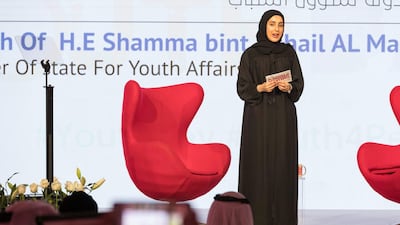In the past six months, a magnifying glass has been held up to the treatment of women around the world. As a sexual assault scandal rocked Hollywood and shocking gender-based pay discrepancies brought the BBC into disrepute, the social media-based #MeToo and #TimesUp campaigns quickly gathered momentum, galvanising women worldwide and giving voice to those who were adversely affected by chauvinistic attitudes. Coming in the centenary anniversary of Britain's suffragette movement, it raised the question of how far we have come, particularly as a World Economic Forum survey last year revealed the global gender gap had increased for the first time in a decade. So a new law enshrining wage equality for working women in the UAE cannot come soon enough. On Tuesday, the UAE Cabinet approved a draft proposal, which will, according to Noura Al Kaabi, Minister of Culture and Knowledge Development, "empower women to pursue equal opportunities and contribute to the UAE's development".
Today the UAE boasts nine female cabinet ministers, including the world’s youngest, Shamma Al Mazrui, who was appointed Minister for Youth Affairs in 2016 when she was 22. The drive towards gender equality in the highest echelons of national politics has trickled down. From astronauts to fighter pilots, there are no job opportunities that this nation’s women are denied today. Women vastly outnumber men in universities. Nevertheless, the WEF Global Gender Gap report, which ranked the UAE 120th out of 144 countries for “wage equality for similar work”, shows there is still plenty of work to be done.
Equal pay is empowering. It shows women that their talents are recognised and valued as highly as those of their male colleagues. Many women spend years proving themselves in the workplace; that climb will certainly seems less steep with government support. But while the proposed law is a strong statement of intent, traditional values may hinder enforcement. Society tends to attribute the responsibility to provide to the father. As a result, men in the UAE tend to receive housing and educational allowances rather than their wives. Navigating these attitudes will be important when implementing the law. Yet these realities should not temper a genuine milestone. Amid increased global scrutiny of the issue, it is refreshing that the UAE’s leadership is taking decisive action to support women in their push for gender equality.
It is worth remembering, too, that the UAE has a legacy of working women contributing to its foundations. In the 1920s and 1930s, while men spent months at sea diving for pearls, their wives traded in property, cattle and gold in their absence. “The woman is half of society. Any country which pursues development should not leave her in poverty or illiteracy,” the UAE’s Founding Father Sheikh Zayed once said. Preserving in law a respect that has existed in the UAE for decades represents an important step on the long road to gender equality.

